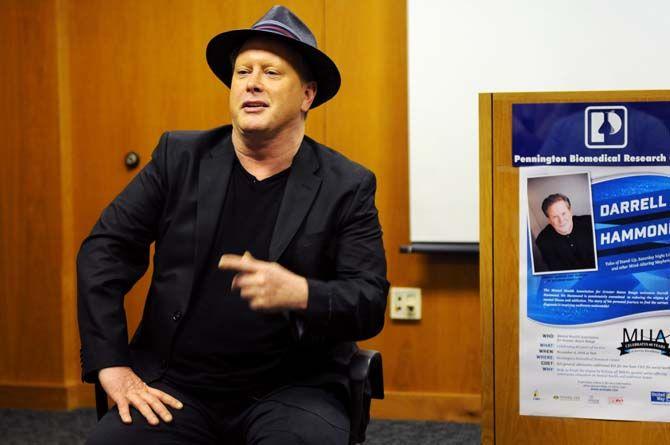It has often been said that laughter is the best medicine. A good joke can ease the worst of pains. Your friend or loved one stuck in traction after an automobile accident is aided immensely by you taking the time to visit and make light of what could be a much worse situation.
Unfortunately, this motto can’t always sustain the weight of people’s agonies. Former cast member of “Saturday Night Live” Darrell Hammond sees humor only as a stepping-stone in the process of helping those who cannot help themselves.
Hammond addressed the Pennington Biomedical Research Center on Tuesday night as the keynote speaker for the 60th anniversary of the Mental Health Association of Greater Baton Rouge. Hammond gave his well-known speech titled “Tales of Stand-Up, Saturday Night Live, and Other Mind-Altering Mayhem.” The speech is part of Hammond’s efforts toward defeating the stigmas against mental illness and addiction.
Along with a Broadway show depicting his life, “The Darrell Hammond Project,” and a best-selling book, “God, If You’re Not Up There, I’m F*cked,” Hammond’s series of lectures have all been part of the actor’s mission to reduce the negative attitude toward mental health issues.
One of his book’s main goals is differentiating between mental illness and mental injury. In “The Darrell Hammond Project,” Hammond finds the specialist who “cracked the code” to be the star of the show. Before finding the true cause of Hammond’s illness, the actor experienced years of varied diagnoses, including schizophrenia, several forms of a personality disorder and Asperger’s.
After years of moving in and out of institutions and hospitals, Hammond’s mental state was found to be the result of an instance of childhood abuse. Specialists compared Hammond’s condition to post-traumatic stress disorder.
“Mental illness is not an airborne virus,” Hammond said. “It doesn’t just occur. It’s not like a newspaper blowing against your leg on the sidewalk, like something random. It has a story. It has a specific story.”
Hammond’s main initiative is abolishing the judgment of mental illness. In that view, mental illness is something that cannot be helped but continually treated.
“You think about having spent so much of my life experiencing that look of fear and pity and revulsion that people exhibit when they realize there’s something wrong with you,” Hammond said. “I knew there was something wrong with me. I just didn’t know what it was.”
Hammond opposes the term “chemical imbalance” and believes his mental illness stems from years of abuse and traumatizing experiences rather than something organically found in the brain. His work is meant to promote acknowledging the dangers of toxic people and abusive relationships. Despite continuous reinforcement of his “chemical imbalance,” Hammond is skeptical it was the accurate reasoning for his mental illness and self-abuse.
Though Hammond had long intended to act against the taboo of mental illness, his work has only recently been able to move forward in his endeavors.
“It feels great,” Hammond said. “I had to wait until [my parents] were dead. I did not want to do this while they were alive. I also didn’t want to do it while I was on ‘Saturday Night Live.’ The real crime to me wasn’t the crime [of abuse]. The real crime was having to cover up the crime. The real crime was having the monster in my world adored.”
You can reach Gerald Ducote on Twitter @geraldducoteTDR.
SNL alumnus Darrell Hammond addresses mental health
November 5, 2014
Darrell Hammond gave a lecture “Tales of Stand-up, Saturday Night Live, and other mind-altering Mayhem” in celebration of the Mental Health Association’s 60th anniversary Tuesday, Nov. 4 at the Pennington Biomedical Research Center in Baton Rouge.








